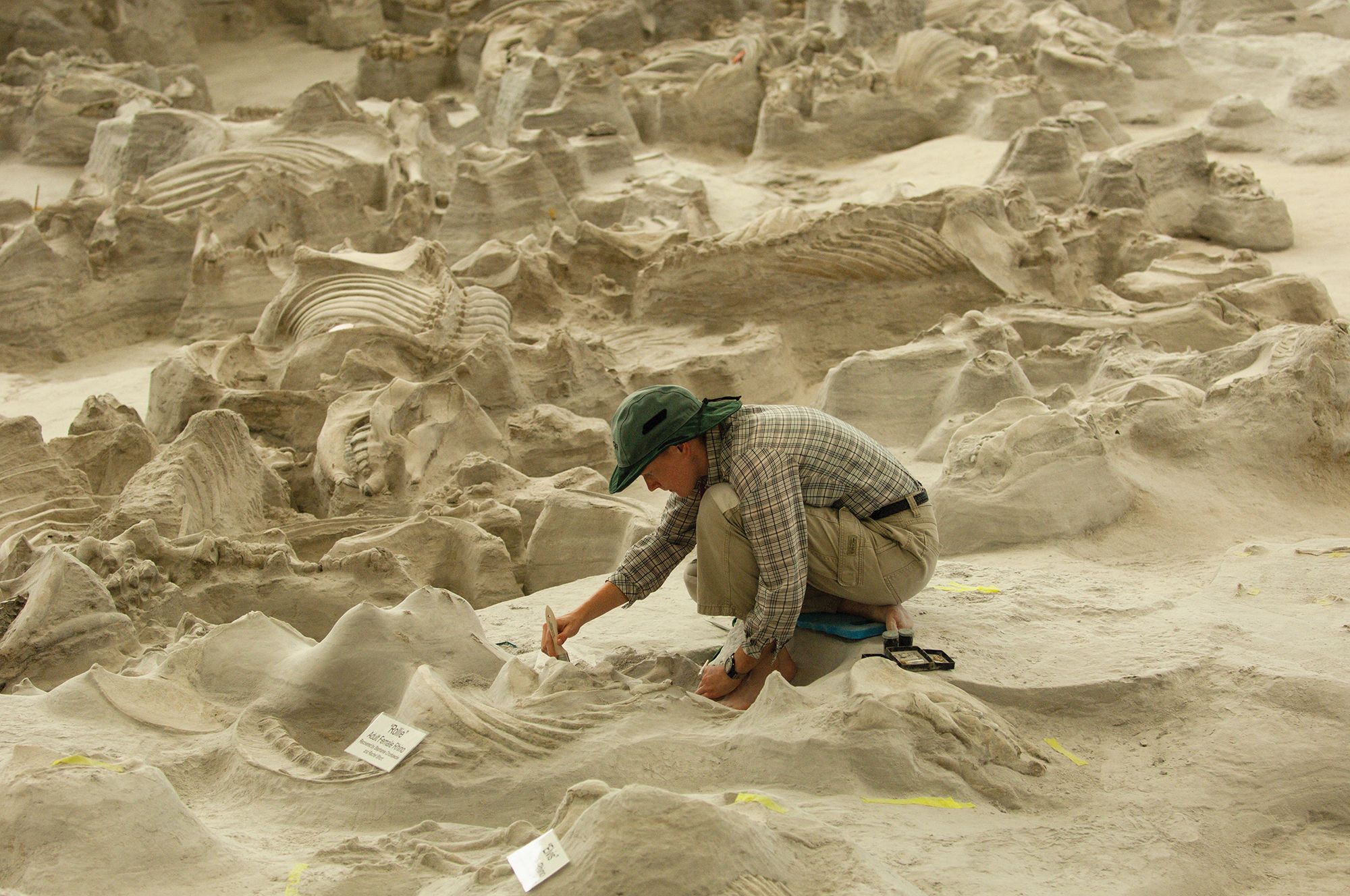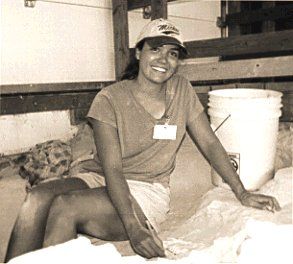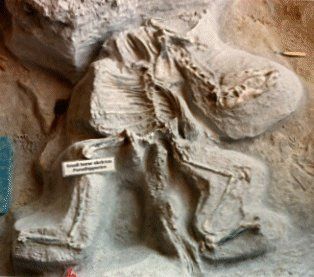
Ashfall Fossil Beds
Delia's Place
< Vertebrate Paleontology Home
Leigh gently ran her brush over the silvery grey ash she was sitting in. It sparkled in the sunlight, and felt as soft against her skin as baby powder. Despite its outwardly beautiful appearance, it was a potentially deadly powder made of microscopic shards of glass. She was working in the last unexcavated corner of the barn which had yielded nothing more than a tiny tail bone. The barn stood on a hill in north central Nebraska and provided shelter for the fossilized skeletons of rhinos and horses and camels left in-situ. The paleontological find was so spectacular that it was made into Ashfall Fossil Beds State Park, so visitors were constantly looking over Leigh's head as she dug.
The wind was calm that morning so the doors of the barn could be opened. Sunlight flooded the inside, and everything sparkled. The ash managed to blow everywhere, even when it wasn't very windy, so the sidewalk and display cases looked like they had been dusted with glitter. The skeletons in the ground sometimes blended in next to the light gray ash, but the sunlight caused a beautiful contrast between the two. The bones were so perfectly articulated and preserved that they looked like they were ready to get up and run away.
Leigh had been working in the same spot for a little over two months and nothing major had surfaced. It seemed unlikely that there were any bones underneath, but it still had to be excavated. So, she brushed away the ash with her small two-inch paint brush, collected it in buckets, dumped the ash elsewhere, and began the whole cycle again. On that morning, however, she brushed over the ash and something black appeared.

She brushed over it again, and it got larger. The spot felt smooth as she ran her finger over it. Her heart skipped a beat, and she knew she hadn't just run into a pebble. The only things previously found in the ash that were black, smooth and shiny were teeth. Leigh hoped it was something extravagant but didn't want to get her hopes up. That had happened before, and no bones turned up. Leigh brushed away a little bit more ash, and the black spot began to take shape. Shortly after, another black square began to appear right next to the first one.
They were teeth! Leigh's heart was pounding. Isolated teeth had never been found in the ash, so it was likely that the skull was present as well. She continued to uncover the area, but it was increasingly difficult to be careful because she was so eager to know what secrets were lying beneath the surface. Two more teeth began to appear. They were incisors.
Slowly, after a few more strokes of the brush the skull bones above the teeth began to emerge into an atmosphere they hadn't seen in ten million years. The skull bones appeared, and they confirmed Leigh's thought. It was a horse! A ten million year old horse! Leigh kept sweeping away.
"Whatchya doin' down there?" a visitor asked. His wife was looking at some other fossils a few feet away. His kids were playfully yelling and running through the barn. Leigh had been so engrossed in what she was doing that she didn't even hear them.
Leigh kept the moment to herself for awhile because it was so early in the morning, but inevitably she had to talk to the visitors. "I just found something ... a horse. These black things are its teeth," she said.
"How do ya know it's a horse?"
"Well, this particular shape and size of these teeth, called incisors, are characteristic of horses." She continued digging while she spoke. "I can tell what the shape of the skull is as well because of these bones, called the nasals and frontals."
The visitors watched Leigh uncover more of the skull, but she was too focused on her horse to even notice. Slowly, she exposed more of the skull. It was very fragile, and some of the bone covering the cheek teeth flaked off. She knew it was a young horse because it still had its baby teeth. Maybe it was just maturing when it died. Leigh decided that it would be a girl, even though there was no way of knowing. She would call her Delia. She'd heard that name somewhere and thought it was nice.
Leigh's time excavating Delia was very intimate. The intracacy increased as she worked, and her mind wandered to Delia's life so long ago. Nebraska was covered with grasses ten million years ago and a few hackberry trees scattered about. Delia had last laid down on the edge of a watering hole, probably the only one around for miles. She knew Nebraska must have been a beautiful place then. So many different animals roamed; elephants, saber toothed cats, bear dogs, rhinos and camels. Smaller creatures roamed around as well, like turtles, rodents and cranes, and they all flocked to the watering hole during the wet season for nourishment and to cool down.
"Hey, how'd all this ash get here?" Leigh snapped back into the present at the sounding of a visitor who had obviously not spent any time in the visitor's center.

"A huge volcano in southwest Idaho erupted, and the jet stream carried the ash in the atmosphere all the way to Nebraska. The ash is thickest in the watering hole, where it measures ten feet thick, and it is thinner in surrounding areas, measuring one to two feet." She hated when the visitors didn't read any of the information. They wouldn't have to ask half the questions they asked if they just took ten minutes to read.
Leigh returned to Delia. She was growing more beautiful every minute. Her vertebrae began to surface, and they were articulated! The excavation was tedious, but she loved every second of it. The vertebrae were so fragile and brittle that she was nervous something might break. Nerves and veins and muscles once ran through these vertebrae, and Leigh was the first human being ever to see them! Leigh's thoughts drifted to the fateful day of the volcanic eruption.
The ash drifted from the west in huge, dark clouds. It began falling lightly at first, and the animals were confused. They were scared because the dust choked them, so most flocked to the watering hole. It was their only place of refuge. The big cats had gone to their burrows to ensure they would not breathe in the frightful powder. Delia probably stayed close to her mother. They probably searched for food and laid together for comfort. But how did Delia...
"This place is amazing! We saw something on TV about it, and had to come and see it for ourselves. How come they all died if the ash only fell for a few days?" It was an old couple. Leigh thought they might have driven a big RV to Ashfall Fossil Beds. They looked like that type; old and ready to conquer the country by way of a huge camper.
"The ash finished falling after a couple of days, but it was deep, like freshly fallen snow. First, the animals breathed in the ash, which was initially deadly to the smaller animals. The turtles', birds' and small horses' lungs were so small that they filled up with ash within a day. So much ash had fallen that it buried the watering hole and all food, so when the animals tried to eat all they got was a big mouthful of ash. Also, the ash was so fine and powdery that every step an animal took stirred up ash causing it to make its way into the animals' lungs. Eventually they all suffocated. There is disease on their bones to prove that they suffocated. Slow suffocation causes calcium deposits to form on the bones; it's kind of the opposite of osteoporosis."
"How long did it take before they died, then?"
"Well, the small animals went right away. The horses and camels lived for three or four days, and the rhinos died after about a week. Some paleontologists think that the baby rhinos lived longer because they were able to nurse and actually get some food. Who knows, though. Everything was wiped out after two weeks at the longest." Leigh loved telling the story to the visitors who were genuinely interested. She felt like the smartest and most interesting person on the planet for at least one moment.
"Isn't that something, Virginia? Just amazing. So, how come some were scavenged if everything was dead?"
"The carnivores hid in their dens avoiding the disaster, so when the ash stopped falling and settled, they had a feast! Hundreds of carcasses laid around the watering hole." The old couple wandered off smiling, talking and taking pictures. They even asked Leigh to pose for a picture, but they wanted her to act like she was digging. Why didn't they just take the picture without asking? That would have been truly natural. People did that a lot, but Leigh was flattered that they wanted her pictured.
Leigh went back to Delia. She came upon some arm bones and a shoulder bone. They were not quite in the order they should have been. Had Delia's small body been scavenged? She continued working, and the rest of her bones were a bit jumbled. It became obvious that someone had made a small meal out of Delia after she died.
Leigh could see it in her mind. Delia probably lost her mother at sometime during the storm. She could see Delia wandering through the strange land she once knew so well. Maybe she cried out for her mother, but to no avail. Leigh pictured Delia, a young horse, trying to find food and water and her mother. The ash created a haze over the sky, and the sun was hidden. Dead animals laid around the watering hole, and more were dropping every second. Maybe Delia knew she was going to die. She was hungry and lonely, but decided she would find a place to lie down. Maybe her mother would find her there.
Delia's mother never found her. She laid on the bank of the watering hole, suffocating. Eventually she laid her head down because she no longer had the strength to keep it raised above the ash. Every breath drew in more and more of the tiny microscopic shards of glass. She gasped for a clean breath of air, but it would never come. Delia probably passed out and died shortly after. Her body laid there for a day or two until the carnivores emerged from their dens. They found her body and began to eat it, but it was covered with too much ash. They left and moved on to another...
Leigh woke from her daydream to the sound of a little kid crying. His parents wouldn't let him out of his stroller. Leigh wished they would so he would stop crying. She stared at her discovery for a long time. No human had ever seen or touched that skeleton before her, and it had once been alive. Breathing and eating and feeling. It had become Leigh's goal to make Delia's skeleton look as beautiful as it deserved. After all, she had lived at a time when Nebraska was thriving with exotic game; at a time when no human beings were even close to being around. This was Delia's place first, and her bones told her story better than any human.
Andria Skaff (aka "Leigh") is a student and former excavator/interpreter at Ashfall Fossil Beds State Historical Park.
By Andria Skaff





